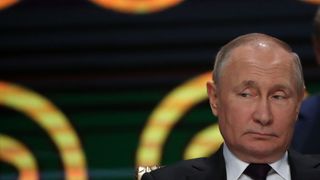Karl Marx may well have been right on this point: history does repeat itself, first as tragedy then as farce, as he argued in a famous essay “18 Brumaire” and as was underlined in a letter from his close friend and confidante, Friedrich Engels.
History does appear to be repeating itself in the Russian war on Ukraine.
The Winter War in Finland in 1939-40 - in which the Finns gallantly defended sovereignty against a massive, unprovoked Soviet assault - sends eerie echoes down the chambers of history.
The tragedy of Putin’s war in Ukraine with its horrific carnage is now accompanied by the farce of bankrupt Russian governance in its own affairs, from the perspective of a cardboard military being reinforced by a chaotic, unwelcome program of conscription.
Earlier times are instructive.
The Soviet dictator, Joseph Stalin, had signed the notorious pact with Nazi Germany in August 1939 that paved the way for the Second World War.
The Molotov-Ribbentrop Pact divided Poland between the two dictatorships and assigned the Baltic states of Lithuania, Estonia and Latvia to Soviet tyranny.
Finland, which had previously been part of the Russian Empire until the end of the Great War, was similarly assigned by the Germans to the Soviets’ sphere of influence.
But the Finns saw things differently.
Three months after the outbreak of the Second World War, in November 1939, the Red Army invaded Finland on a massive scale.
But the winter worked for the Finns.
The Soviet conscript army was dealt continuous heavy blows in the field.
Soviet equipment was found wanting in just about every sphere on the ground. In the air, their preponderance of aircraft mattered little.
To the astonishment of the world, the Finns mobilised successfully.
It is estimated that up to a quarter of the Finnish population donned uniform.
Under the leadership of Marshal Mannerheim, the Finns conducted a skilful campaign involving ambush, fighting withdrawals and counter attacks which inflicted terrible causalities on the Russian columns, bound to the roads.
This grew so appalling that some Russian units had to be forced to the front at gun point.
Stalin’s secret police, the NKVD, then became active with its normal, blood-soaked intervention.
The purges were the responsibility of a fanatical Stalinist general, Lev Mekhlis.
Many innocent Red Army Commanders went to their deaths for Stalin’s strategic ignorance.
Does this sound at all familiar?
Confronted by a battlefield debacle Stalin, like Vladimir Putin, doubled down.
The Red Army was reinforced and as the spring arrived in 1940 gradually the Soviets achieved superiority over their small neighbour. A peace treaty was signed.
The Germans watched this most carefully. Mannerheim and the Finns had taught them the vaunted Red Army was much less than the sum of its parts.
No less than Winston Churchill commented that the Finns were showing the whole world how to fight. Again, the chimes of familiarity are ringing.
This brings us to the future of the war in Ukraine, with Putin ostentatiously putting his thumb back on the nuclear button. We should realise there is no such creature as a “tactical” nuclear device. There are nuclear weapons, full stop. On most occasions, whenever the use of so-called “tactical” or “battlefield” nuclear weapons has been war-gamed, especially in academia, a battlefield nuclear attack has degenerated into a comprehensive nuclear war between the Russians and the West.
This brings us to the future of the war in Ukraine, with Putin ostentatiously putting his thumb back on the nuclear button.
We should realise there is no such creature as a “tactical” nuclear device. There are nuclear weapons, full stop.
On most occasions, whenever the use of so-called “tactical” or “battlefield” nuclear weapons has been war-gamed, especially in academia, a battlefield nuclear attack has degenerated into a comprehensive nuclear war between the Russians and the West.
This is unthinkable.
However, Russian nuclear doctrine holds that when the Motherland is threatened, then nuclear weapons may be used.
This is why Putin is incorporating eastern Ukraine into his ramshackle empire.
To deploy reservists effectively, the Russians will need some three to six months for training, equipping, and organising.
This is unlikely to occur, given what we have seen to date.
That means the “reservists”, some of whom have not seen military duty, let alone combat, will be sent into the fray as mere cannon fodder to defend against threatening Ukrainian advances.
The casualties will be fearful.
But Putin must proceed in the same manner as Stalin.
Battle deaths are irrelevant, the Russian dictator needs a “victory”, just as he required his referendum “endorsement” in the Donbass.
His only off-ramp must be marked “triumph”.
It may be a hollow victory of appalling consequences and dismissed in the West.
But it simply underlines that Karl Marx knew what he was talking about when he and Friedrich Engels exchanged views.




